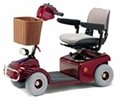Recovery from Dehydration in the Elderly
My older sister is 80 and was recently in the hospital for dehydration in the elderly. She was vomiting everything, including water for almost a week.
She was in the hospital for 2 and a half days. She has had heart & lung surgery in the past, but tests were taken and we were told everything is fine.
She is back home, but very weak and tired. Her husband wants to put her in a nursing home because he feels she is not getting any better. She has not thrown up in the past 2 days, but she is still weak and very tired.
How long should she be like this? Should my brother in law be expecting her to be up and moving by now?
REPLY from Caring-for-Aging-Parents.com
Dehydration in the elderly is serious. Your sister was not able to eat or drink for over a week. Even for someone half her age it would take at least a few weeks to fully recover.
Given that your sister is 80 years old, it could easily take weeks and even a couple months before she is fully recovered.
I would not rush to move her into a nursing home. It's too early to know how she will recover.
In the meantime, her and your focus should be on getting her better and preventing her from falling (which can often occur when people are weak and tired). For more information, Fall Prevention in the Elderly.
She may benefit from some safety equipment (walker, wheelchair, bathroom equipment, etc), home support services (assistance with personal care, meal prep, shopping, etc), follow up with
For more information on these topics:
It may also be beneficial for a family member or friend to stay with her until she feels better. Besides helping with tasks around the house, she will also enjoy the companionship.
Many seniors simply need time to recover and these services and equipment may only be needed for a short period of time (1-2 months).
In some instances, seniors may go to a facility to recover before returning home (often called respite care). These rehabilitation centers are referred to as sub acute rehabilitation facilities, skilled nursing facilities or convalescent care facilities. They provide meals, nursing care and monitoring, assistance with personal care if needed and access to rehabilitation services such as physical and occupational therapy.
Your family doctor should be able to refer you to the appropriate facilities and health care professionals to provide help for elderly. Depending on her health insurance coverage, she may or may not have to pay a fee.
In Canada, some of these services are covered but some provinces charge for home support services. There is often a per-day charge depending on income.
In USA, depending on her MediCare coverage, she may have to pay for some of the services. Some Veterans or spouses of veterans may also have supplemental coverage. Your sister may have supplemental insurance that covers above and beyond MediCare.
For more information about preventing dehydration in the eldelry in the future, read our article on: Dehydration in the Elderly.
Thank you,
Kevin
Return to Caring for Aging Parents





